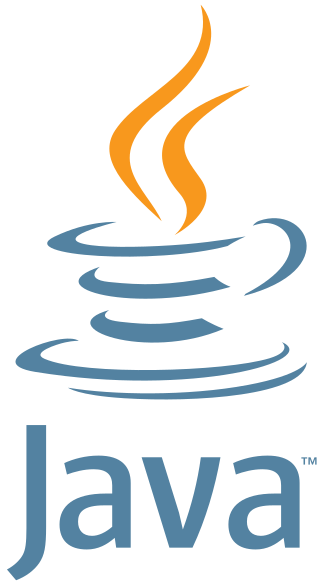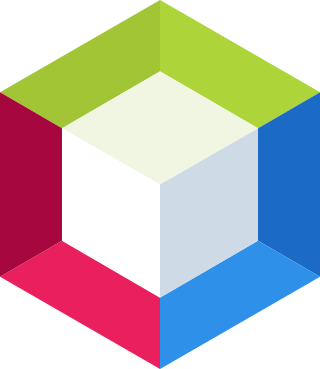
Java is a high-level, class-based, object-oriented programming language that is designed to have as few implementation dependencies as possible. It is a general-purpose programming language intended to let programmers write once, run anywhere (WORA), meaning that compiled Java code can run on all platforms that support Java without the need to recompile. Java applications are typically compiled to bytecode that can run on any Java virtual machine (JVM) regardless of the underlying computer architecture. The syntax of Java is similar to C and C++, but has fewer low-level facilities than either of them. The Java runtime provides dynamic capabilities that are typically not available in traditional compiled languages.
Jakarta Enterprise Beans is one of several Java APIs for modular construction of enterprise software. EJB is a server-side software component that encapsulates business logic of an application. An EJB web container provides a runtime environment for web related software components, including computer security, Java servlet lifecycle management, transaction processing, and other web services. The EJB specification is a subset of the Java EE specification.

Jakarta EE, formerly Java Platform, Enterprise Edition and Java 2 Platform, Enterprise Edition (J2EE), is a set of specifications, extending Java SE with specifications for enterprise features such as distributed computing and web services. Jakarta EE applications are run on reference runtimes, which can be microservices or application servers, which handle transactions, security, scalability, concurrency and management of the components they are deploying.
Java Platform, Micro Edition or Java ME is a computing platform for development and deployment of portable code for embedded and mobile devices. Java ME was formerly known as Java 2 Platform, Micro Edition or J2ME. As of December 22, 2006, the Java ME source code is licensed under the GNU General Public License, and is released under the project name phoneME.
In computing, the Java Remote Method Invocation is a Java API that performs remote method invocation, the object-oriented equivalent of remote procedure calls (RPC), with support for direct transfer of serialized Java classes and distributed garbage-collection.

NetBeans is an integrated development environment (IDE) for Java. NetBeans allows applications to be developed from a set of modular software components called modules. NetBeans runs on Windows, macOS, Linux and Solaris. In addition to Java development, it has extensions for other languages like PHP, C, C++, HTML5, and JavaScript. Applications based on NetBeans, including the NetBeans IDE, can be extended by third party developers.

Swing is a GUI widget toolkit for Java. It is part of Oracle's Java Foundation Classes (JFC) – an API for providing a graphical user interface (GUI) for Java programs.
Jakarta Faces, formerly Jakarta Server Faces and JavaServer Faces (JSF) is a Java specification for building component-based user interfaces for web applications. It was formalized as a standard through the Java Community Process as part of the Java Platform, Enterprise Edition. It is an MVC web framework that simplifies the construction of user interfaces (UI) for server-based applications by using reusable UI components in a page.
Java Management Extensions (JMX) is a Java technology that supplies tools for managing and monitoring applications, system objects, devices and service-oriented networks. Those resources are represented by objects called MBeans. In the API, classes can be dynamically loaded and instantiated. Managing and monitoring applications can be designed and developed using the Java Dynamic Management Kit.
Javadoc is a documentation generator created by Sun Microsystems for the Java language for generating API documentation in HTML format from Java source code. The HTML format is used for adding the convenience of being able to hyperlink related documents together.
In software engineering, a plain old Java object (POJO) is an ordinary Java object, not bound by any special restriction. The term was coined by Martin Fowler, Rebecca Parsons and Josh MacKenzie in September 2000:
"We wondered why people were so against using regular objects in their systems and concluded that it was because simple objects lacked a fancy name. So we gave them one, and it's caught on very nicely."

Java is a set of computer software and specifications that provides a software platform for developing application software and deploying it in a cross-platform computing environment. Java is used in a wide variety of computing platforms from embedded devices and mobile phones to enterprise servers and supercomputers. Java applets, which are less common than standalone Java applications, were commonly run in secure, sandboxed environments to provide many features of native applications through being embedded in HTML pages.
The Java language has undergone several changes since JDK 1.0 as well as numerous additions of classes and packages to the standard library. Since J2SE 1.4, the evolution of the Java language has been governed by the Java Community Process (JCP), which uses Java Specification Requests (JSRs) to propose and specify additions and changes to the Java platform. The language is specified by the Java Language Specification (JLS); changes to the JLS are managed under JSR 901. In September 2017, Mark Reinhold, chief Architect of the Java Platform, proposed to change the release train to "one feature release every six months" rather than the then-current two-year schedule. This proposal took effect for all following versions, and is still the current release schedule.
Jakarta Persistence is a Jakarta EE application programming interface specification that describes the management of relational data in enterprise Java applications.
The Jakarta Expression Language is a special purpose programming language mostly used in Jakarta EE web applications for embedding and evaluating expressions in web pages. The specification writers and expert groups of the Java EE web-tier technologies have worked on a unified expression language which was first included in the JSP 2.1 specification (JSR-245), and later specified by itself in JSR-341, part of Java EE 7.

JavaFX is a software platform for creating and delivering desktop applications, as well as rich web applications that can run across a wide variety of devices. JavaFX has support for desktop computers and web browsers on Microsoft Windows, Linux, and macOS, as well as mobile devices running iOS and Android, through Gluon Mobile.
Within computing, Jakarta Activation is a Jakarta EE API that enables developers to:
The Internet Foundation Classes (IFC) is a GUI widget toolkit and graphics library for Java originally developed by Netcode Corporation and first released by Netscape Corporation on December 16, 1996.
Project Darkstar was an open-source MMOG middleware solution written in Java. Project Darkstar began as a personal project of Jeff Kesselman in 1999. It later became a research project at Sun Microsystems, and aimed to "help developers and operators avoid a range of serious, yet typical, problems associated with massive scale online games, virtual worlds, and social networking applications today, including zone overloading, data corruption, and server underutilization."





